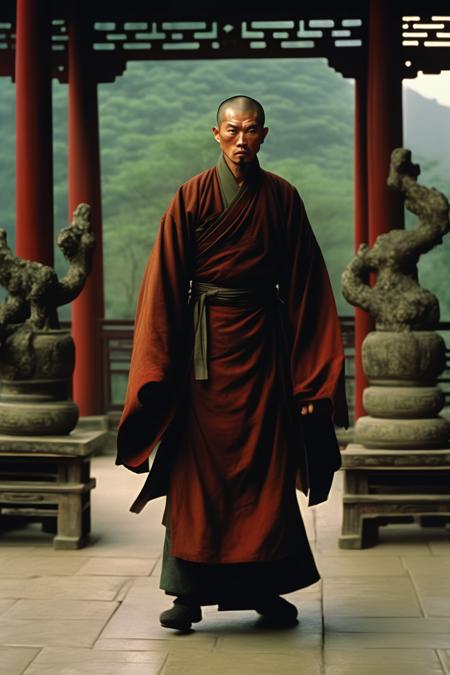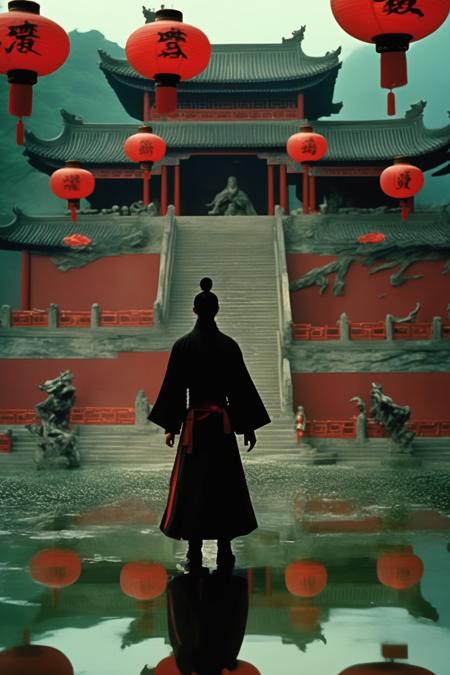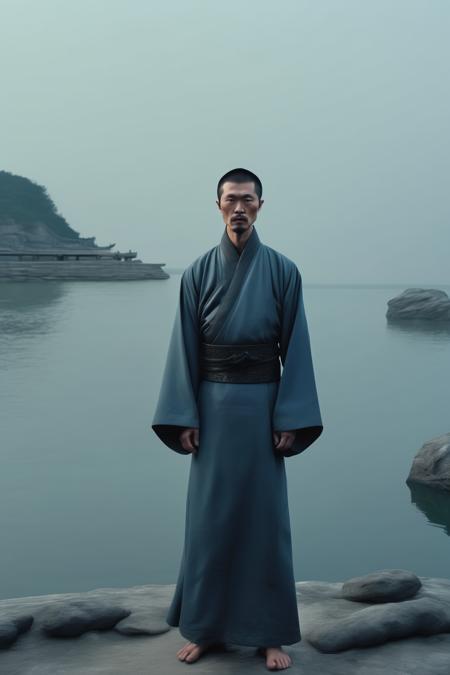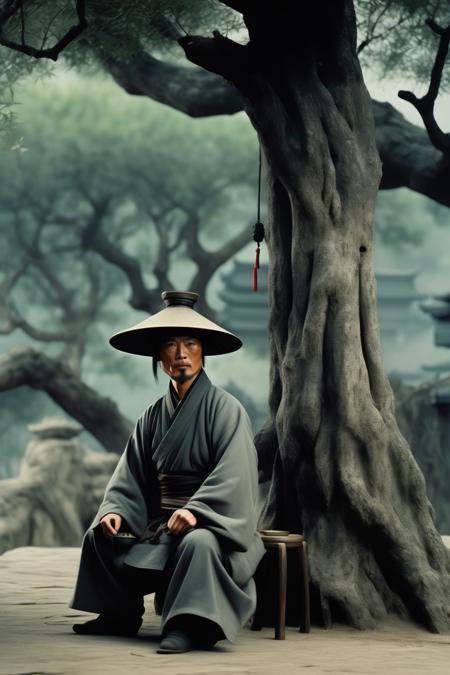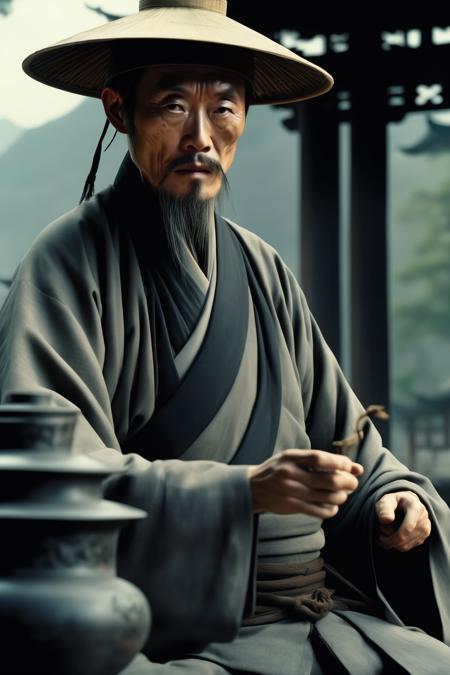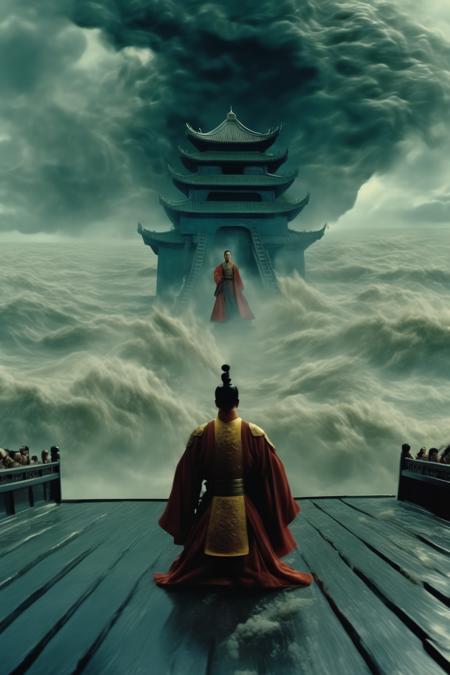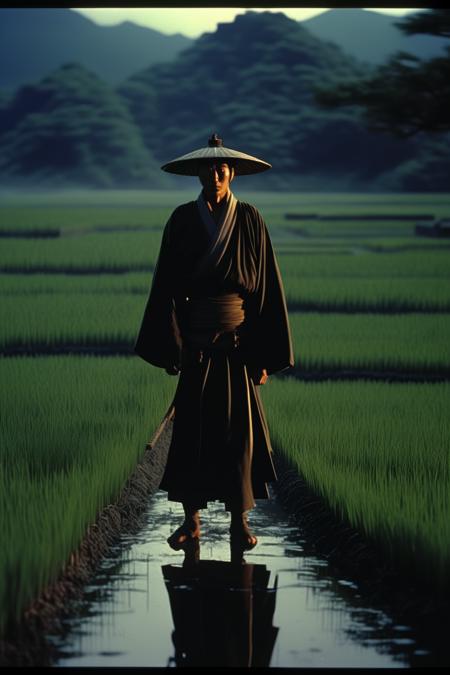Director Zhang Yimou style (CivitAI
Director Zhang Yimou style -In an ancient Chinese Temples. a young chinese boy with black Braided hair and steely eyes,clad in black and red Hanbok, Animal skin shawl, fur cloak, holding a long sword in her hand,,surroundedsoldiers clac in armor,Cloudy day,Photography,Super realistic Surprisingly portrayed features,Super realistic,movie stills, characters full of details, the picture has impact Global Illumination,Perfect Lighting,Epic Lighting, Symmetrical+ Detailed+ Cravag Lighting Style, Character Portrait Best Quality,High Resolution,HDR, Shallow depth field,blurred background,raytracing,dslr,Maxon C4[ arnold render,V-Ray,High Detail,3D rendering
Zhang Yimou is a Chinese filmmaker known for his visually stunning and emotionally resonant style, characterized by his masterful use of color, choreography, and storytelling that often explores themes of love, sacrifice, and historical or cultural contexts.
Visual aesthetics, particularly the use of color, are central to Zhang's style. He has a remarkable ability to create visually captivating scenes through the careful selection and manipulation of colors. His films often feature vibrant and lush palettes that enhance the mood and atmosphere of the narrative.
Choreography and staging play a significant role in Zhang's films. He often employs intricate and visually dynamic action sequences, especially in his wuxia (martial arts) films. The choreography adds a sense of artistry and visual spectacle to his work.
Storytelling that weaves personal relationships into larger historical or cultural contexts is a recurring element of Zhang's films. He often uses intimate stories to explore broader themes and societal changes, offering a window into China's history and cultural evolution.
Emotional resonance is a hallmark of Zhang's style. He skillfully captures the emotional journeys of his characters, often evoking a sense of longing, sacrifice, and human connection. His characters often confront challenges that reflect universal human experiences.
Collaboration with composers like Tan Dun and Zhao Jiping has resulted in evocative and emotionally charged scores that complement the themes and visuals of Zhang's films. Music plays a significant role in enhancing the emotional impact of his storytelling.
Zhang's films often highlight the contrasts between tradition and modernity, as well as the tensions between individual desires and societal expectations. He addresses the complexities of Chinese identity and history through narratives that resonate both locally and internationally.
Zhang Yimou's films like "Raise the Red Lantern," "Hero," and "House of Flying Daggers" have received international acclaim for their blend of visual beauty, emotional depth, and exploration of cultural themes. His unique style continues to captivate audiences and leave a lasting impact on world cinema.
Image examples for the model:
Director Zhang Yimou style - multiple combat action, 1998' film photography, full details, film photography, While on the run, accidentally meets father, who has settled down at Yanmen county as his daughter is married to a local squire surnamed . The squire shelters in his manor but the place is not absolutely safe. suggests conceal his identitybecoming a Buddhist monk at the Manjusri Monastery on nearby Mount Wutai. The abbot at the monastery accepts and gives him the name "Zhishen", which means "sagacious". is henceforth known as Zhishen. He also acquires the nickname "Flowery Monk" because his body is tattooed with flowers. Finding monastic life dreary, one day Zhishen buys and consumes all the wine solda wine seller crossing the mountain. When he returns to the monastery drunk, the monks stop him from entering the gate. He breaks in and beats them up. He comes back to his senses when the abbot appears and gives him a dressing down. He is given a second chance. Soon, feeling bored again, Zhishen sneaks down to the nearby town. There he asks a blacksmith to make him a monk's staff weighing 62 jin and a dagger. He then visits an inn where he eats and drinks without restraint, disregarding Buddhist prohibitions. When the monks on Mount Wutai see Zhishen coming back intoxicated, they immediately shut the gate on him. But smashes the two towering jingang statues flanking the gate, breaks into the monastery, beats up the monks and messes up the meditation hall. This time, the abbot decides to send him to the Great Minister's Temple in the imperial capital Dongjing, Very strong, monk clothes showing half of the shoulders, many tattoos on his body, multiple combat action, The four broken statues around the four vajra, Apex, post processing, dark gold and green, epic portraiture, action-packed scenes, abrasive authenticity, close-up intensity, two shot(2S),three shot(3S).group shot(GS)
Director Zhang Yimou style - [80518606596611217]An intense martial arts scene depicting "Descending Dragon 18 Palms" against "Lonely Nine Swords" in a traditional Chinese courtyard setting. a tall and muscular man with a rugged appearance, wears a black robe and has a thick beard. a slender and agile young man with long hair, wears a white outfit and holds two swords. The two warriors stand facing each other, eyes locked in a fierce stare-down. The camera angle is low, showing the intricate movements of the fight from a dynamic perspective. The lighting is natural, with the sun casting shadows and highlighting the details of the fighters' faces and costumes. The swords clash loudly and sparks fly as they exchange rapid blows. In the background, other characters watch the duel in awe, adding to the dramatic tension of the scene. The painting captures the spirit of classic Chinese martial arts and the legendary characters of novels. UHD, 16k, retina
Director Zhang Yimou style - An ancient Chinese man wearing a straw hat was drinking tea under a tree, with his back leaning against the tree, facing away from the camera, leaning sideways and wearing a gray cloth suit. He had a martial arts temperament with a gray color tone and high contrast, inspired martial arts film "Shadow". The composition was atmospheric and majestic, and on the other side of the man was an open grassland. In the distance, there was a mountain, and the characters were far from the camera. The Chinese tea set, and the man looked like Chinese actor A cloudy day without sunlight,, Asymmetrical Composition, Long Shot, Cinematic light, The low-purity tone, 16K Resolution, cinematic, wuxia, Postmodern Photography
Director Zhang Yimou style - An ancient Chinese man wearing a straw hat was drinking tea outside a pavilion. A man was outdoors, facing away from the camera, leaning sideways, wearing a gray cloth suit with a martial arts temperament and a high contrast. The scene was inspired martial arts film "Shadow", with a grand and majestic composition. On the other side of the man was an open grassland, and in the distance was a large mountain. The characters were far from the camera. The Chinese tea set, and the man resembled Chinese actor A cloudy day without sunlight, Asymmetrical Composition, Long Shot, Cinematic light, The low-purity tone, 16K Resolution, cinematic, wuxia, Postmodern Photography
Director Zhang Yimou style - A Shaolin monk meditates in an ancient Zen hall, behind him are rows of old wooden meditation chairs, and a Zen painting hangs on the wall. The monk is dressed in a traditional robe, his facial expression is calm, his hands are clasped together, and his whole body exudes a peaceful power. Medium: Photography. Style: Hyper-realism, referencing black and white photography. Lighting: Natural light slants in from the window, hitting the monk, creating a contrast of light and shadow. Colors: Black and white tones, emphasizing light and shadow and texture. Composition: Use Canon 5D EF 50mm f 1.8 STM lens, 30.4 megapixels, ISO sensitivity: 32,000, speed 8000 second.
Director Zhang Yimou style - This is a scene from the movie (looking up), with the camera aimed at the Ming Dynasty Emperor of China (front) (close shot). The environment is in a fierce storm, where the emperor is crouching on a magnificent ship, kneeling on an inclined deck, praying to the sky in despair. The emperor is at the front, kneeling on the ground and raising his hands high up to the sky. A shining island appears in the sea, and the scene is filled with an atmosphere of despair and fear, There are huge waves shooting on the deck, CG illustration, wide angle, tilted frame (Dutch angle lens)
Director Zhang Yimou style - A screengrab of a 1985 drama film directedmovie is based in ancient Japan, a samurai is standing in a rice field after a defeating battle, detailed cinematic still shot with low-key lighting, filmed on an Ultra Panavision 70 Camera, film grain, dramatic lighting, complex, at night. 1980s, cinematic shot, incredibly detailed, sharpen, details, professional lighting, film lighting, 35mm, anamorphic lightroom cinematography, shot on Panasonic HC-X1,eastman color negative film 5247, 35mm
- Downloads last month
- 11
Model tree for KappaNeuro/director-zhang-yimou-style
Base model
stabilityai/stable-diffusion-xl-base-1.0
